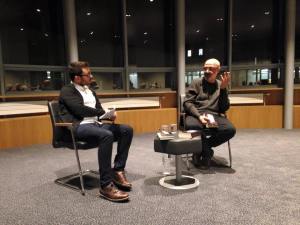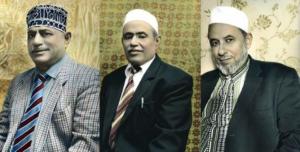Recently, our series Representing Muslims in Scotland and the North East came to an end after four successful events. Now I wish to reflect on the events separately and together to consider any interesting themes that have developed. Overall the series was a resounding successful with large audiences and much interest within and outside the University. Peter Cherry and I are particularly happy to be contributing to public conversations about what it means to be Scottish and Muslim, and hope many of the points of discussion raised during the series will continue to inspire debate.
In the first event, Leila Aboulela read from her upcoming novel which is partially set in Scotland. This was very much enjoyed by the audience, many of whom were big fans of Leila’s work. Indeed, one audience member was intrigued by the fact that they could hear Arabic rhythms in Leila’s English reading style. The setting for her new novel signals her continual interest in setting her writing in Scotland, following the lead of The Translator and Coloured Lights. Some topics I discussed with Leila after her reading included the importance of faith in the creation of her distinct writing style, how considerations of gender had developed over her writing career and the relationship between the romance genre and movements between cultures.
Both students and members of the public were moved by Iyad Hayatleh’s poignant reading in the second event. Well known in the UK and worldwide for his moving poetry, Iyad first came to the UK – which he describes as ‘where no further north exists’ in his poem ‘Fifty’ – from Syria in the early 2000s. After being granted asylum, he was moved to the Sighthill towerblocks in Glasgow, a famous symbol for the UK government’s policy at the time of moving asylum seekers and refugees from the same country to the same area of the UK. Iyad’s reading and answers to Peter’s questions emphasised the importance of the personal in his poetry. Before each poem, he recounted the motivation behind his writing which showed his prowess as a storyteller as well as a poet. Iyad read first in Arabic, then English (with help from Tessa Ransford) and, like Leila’s reading, more than one audience member commented afterwards on the Arabic rhythms in the English readings. It became clear during the event that his creative output and personal experiences are inextricable. Iyad describes himself as Scottish rather than British, which is clear in his poetic output, for instance his poem ‘My New Homeland’ was recently published in the Scotia Nova anthology. Part of his strong connection with Scotland comes from how he has been supported here as an artist. During the Q&A, Iyad described the importance of his involvement with the ‘Artists in Exile’ writing group in Glasgow about 10-12 years ago. His collaboration with Tessa Ransford in Rug of a Thousand Colours is testament to the significance of collaboration in his creative process.
Our last event, a screening of Tina Gharavi’s film The Last of a Dictionary Men, was particularly enjoyable because of Tina’s insightful and witty responses to Peter’s questions. The film follows a young man tracing the ancestry of his late grandfather who was a Yemeni sailor who moved to South Shields to work in the shipbuilding industry. The film is particularly relevant to ongoing discussions about the importance of immigration because of the way it links the history of migration to present day multiculturalism. Indeed, Tina recounted afterwards that in an informal street survey of South Shields, they found that 1 in 4 people had known Yemeni heritage. The narrator concluded the film by polemicising that ‘Multiculturalism can work in the UK. It worked for South Shields. I’m proof of that.’ After the film, Tina discussed in detail her passion for Newcastle, her place within the British film industry and the importance of regionalism within that and her preference for ‘Spike Lee not Mike Leigh’.
Overall some interesting themes emerged from the talks. A strong sense of local identity was apparent in all our speakers. Both the passion Tina expressed about Newcastle and her creative output that centres around the North East shows how important the area is to her as an individual and a film maker. Similarly Iyad Hayatleh identified as Scottish over British, and in particular he has strong affinities towards where he lives in Glasgow.
None of our guests would define themselves primarily with the label ‘Muslim writer’ first and foremost, which is a very common sentiment amongst writers of Muslim heritage writing about Muslims in Britain. In fact, many writers and filmmakers in wider canons dislike labels as it can feel restrictive as well as give a sense of pressure to talk about that particular subject. However, both Leila and Iyad’s creative work is overtly linked to their faiths. Leila’s famous writing style has showed what she terms ‘narratives of Muslim logic’ and the structure of Iyad’s Rug of a Thousand Colours is inspired by the five pillars of Islam.
All the events gave a sense of the way each speaker has journeyed in their lifetime and how this has contributed to their cultural output. All were born outside the UK and have lived in several different places. Tina’s films often show journeys of different kinds. Her film I am Nasrine features a brother and sister who flee Iran to live in Newcastle. Indeed The Last of the Dictionary Men was spurred by a wish for the journeys that the last Yemeni sailors of South Shields took not to be forgotten. Tina’s family claimed asylum in the UK in 1979 when fleeing the Iranian Revolution. During her Q&A, she lamented how much the asylum process has changed since then and how much more traumatic it would be today. She posed the question, ‘after moving so much – what else could I do but become a film maker?’ Indeed, for Iyad, writing poetry was a form of therapy after moving to the UK. Similarly, during her Q&A, Leila explained how she only began writing once she was in the UK because it gave her a clearer perspective of home.
You can listen to our introductory lecture by Claire Chambers here http://goo.gl/WIy3Nm
You can also listen to Iyad Hayatleh’s event here http://goo.gl/O8JDkz
You can listen to Tina Gharavi’s event here http://goo.gl/gNfMlw
– Written by Sibyl Adam.

